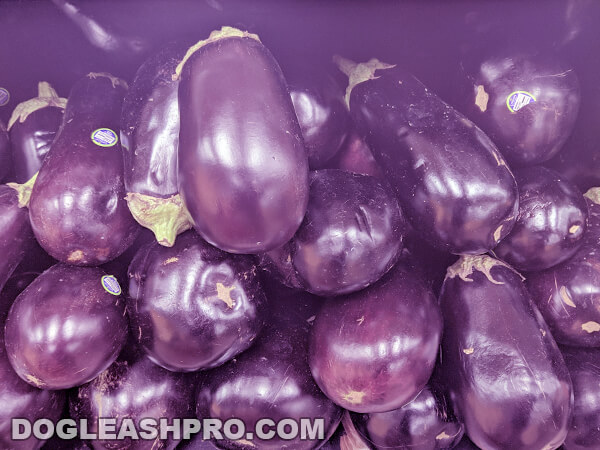
There are some nutrient-packed human foods that dogs can eat. Is Eggplant one of them? Before you give some of that Eggplant to your furry friends, you’ll want to read this first for safety measures.
Can dogs eat Eggplant? Yes, dogs can eat Eggplant as it is packed full of nutrients while being low on calories. But considering how different the doggy gut is to ours, dogs should eat Eggplant in moderation. It’s also best for dogs to eat Eggplant raw or plainly cooked; without any added seasonings and oils.
Table of Contents
Can dogs have Eggplant?
Yes, dogs can have Eggplant. Most healthy dogs eat Eggplant without experiencing any side effects. The only exceptions are sick dogs or dogs who have an Eggplant allergy. So, what is an Eggplant?
What is an Eggplant?
Eggplant is a purple fruit belonging to the nightshade family of plants, like potatoes, tomatoes, and bell peppers. Eggplant gets its name from the uncanny resemblance of its fruit to eggs. It also goes by the name of Brinjal and Aubergine.
You might also like: Can Dogs Eat Potato Salad?
Is Eggplant good for dogs?
Eggplant is packed with high-quality nutrients. It is also surprisingly low in calories compared to other fruits and veggies of its kind, making it an ideal snack for weight loss in dogs.
Eggplant is rich in B vitamins such as B1 and B6, as well as vitamins A, K, C, and K. It’s also dense in folates, potassium, calcium, phosphorous, and magnesium. Eggplant has minimal fats while having lots of fiber. These nutrients can have several perks for your pooch, which we’ll discuss next.
Health benefit of Eggplant for dogs
The nutritional value of Eggplant for dogs makes this fruit a healthy snacking option as long as they’re not allergic to it. Here are some health benefits this power-packed food carries for your fur buddy.
1. Aiding digestion
The high fiber content in Eggplant ensures regular bowel movement in dogs. It also helps solidify poop so that the poop is firm and formed and keeps your furry friend’s intestines clean.
2. Reducing blood pressure
Some micronutrients in Eggplant relax the blood vessels, reducing blood pressure and easing hypertension in dogs.
3. Improving cardiac health
Eggplant has chemicals that improve cardiac health by absorbing excess cholesterol in the dog’s blood and reducing blood pressure.
4. Preventing cell aging
Eggplant has antioxidants that counter the harmful effects of free radicals in a dog’s body. They prolong cells’ lives and prevent aging in dogs.
5. Helping with weight loss
The low fat and high fiber content in Eggplant makes it an ideal snack for our canine friends. The fiber also keeps the dog feeling full throughout the day.
6. Preventing cancer
Eggplant contains phenols, which prevent the formation of tumors and cancerous growths in our K9 pals.
7. Snappy muscle and nerve function
A single serving of Eggplant contains 188 mg of potassium. This mineral improves the electrical transmission between a dog’s muscles, heart, and nerves.
Is Eggplant safe for dogs?
Yes, Eggplant is safe for dogs if prepared the right way before consumption. The way you prepare the Eggplant matters, as does the type of Eggplant you should feed your dog. To give your canine buddy maximum benefits of this fruit or vegetable dish, feed them unseasoned, cooked, organic Eggplant—free from oils and fatty additives.
But the answer to “is Eggplant safe for dogs to eat?” isn’t always yes. Let’s discuss why.
Is Eggplant bad for dogs?

Most of the time, Eggplant is as safe and healthy for dogs as it is for us. Only in some instances are Eggplants bad for dogs. These cases involve dogs with an Eggplant allergy and medical conditions that Eggplant would aggravate.
We should also keep in mind that Eggplant is human food, and for dogs, it qualifies as a snack. Eggplant is a riskier snack option compared to other, healthier snacks. Here are six reasons why.
1. Toxicity
The leaves and stem of the Eggplant contain solanine, which is a natural pesticide. The only part of an Eggplant safe for dogs is the flesh of the fruit.
2. Iron deficiency
Eggplant contains nasunin: a compound that absorbs iron from blood cells. This chemical can lead to an iron deficiency.
3. Inflammation
The oxalate content of Eggplant supports inflammation and is terrible for dogs with arthritis.
4. Indigestion
The tiny amount of solanine in a single Eggplant isn’t dangerous; however, too many Eggplants can cause stomach upset in dogs.
5. Reduced calcium absorption
Oxalates also prevent the blood from absorbing calcium effectively, promoting unwanted calcium deposits in the body.
6. Sodium poisoning
Eggplant can contain an unhealthy amount of sodium. Dogs only need a tiny amount of sodium in their daily diet, and an excess can lead to sodium poisoning.
Did you know: The leaves, roots, and the pit of the plums contain a chemical compound called hydrogen cyanide. But does the flesh of the plum contain this compound? Check out Can Dogs Eat Plums? to find out if dogs can eat this sweet purple fruit.
When shouldn’t you feed Eggplant to your dog?
While Eggplant is a generally safe vegetable, certain conditions make it a terrible meal choice for your four-legged friends. Dogs with arthritis, kidney issues, iron deficiency, and an allergy to nightshade plants will have an adverse reaction to Eggplant.
Let’s discuss the risks of feeding Eggplant to dogs in a bit more detail.
Is Eggplant toxic to dogs?

While Eggplant is harmless for most dogs, some of its properties can make it dangerous for canines with sensitivities. Following are some such health conditions:
1. Arthritis
Eggplant has a relatively high concentration of oxalates. While harmless for healthy dogs, these oxalates can aggravate inflammation and swelling in dogs suffering from arthritis.
Symptoms:
- Joint pain.
- Swollen joints.
- Discomfort walking and standing.
2. Allergies
Eggplant belongs to the family of peppers, tomatoes, and potatoes. If your pooch is allergic to either one of those veggies, they will likely be allergic to Eggplant.
Symptoms:
- Rash.
- Swelling.
- Difficulty breathing.
- Vomiting.
- Diarrhea.
- Itching.
3. Kidney and bladder stones
Oxalates reduce calcium absorption in the blood. This unabsorbed calcium can form deposits in a dog’s kidney and gall bladder. If you know your canine friends have a history of such issues, they shouldn’t eat Eggplant.
Symptoms:
- Pain when urinating.
- Difficulty peeing.
- Blood in the urine.
- Frequent peeing.
4. Sensitive stomach
While safe in moderate quantities, Eggplant can take a toll on your dog’s gut if eaten in excess. Dogs with sensitive tummies should avoid Eggplant at all costs.
Symptoms:
- Loss of appetite.
- Vomiting.
- Loose or watery diarrhea.
- Nausea.
Did you know: Sometimes dog owners feel overwhelmed and confused when their dogs have diarrhea but act fine. Check out My Dog Has Diarrhea But Is Acting Fine to find out why.
5. Iron deficiency
Eggplant also reduces the blood’s iron-absorbing ability. It can cause problems for dogs already suffering from iron deficiency.
Symptoms:
- Pale gums.
- Low energy.
- Weight reduction.
- Bloody stool.
Is Eggplant poisonous to dogs?
No, Eggplant is not poisonous to dogs. Some dogs may have an allergic reaction to this vegetable or fruit, but overall, Eggplant is safe for dogs.
Are Eggplant leaves poisonous to dogs?
Yes, Eggplant leaves are poisonous to dogs. Eggplant leaves contain a natural pesticide called solanine in concentrated quantities. This toxin can mess with a dog’s digestive system and can cause your furry family member to feel nauseous, disoriented, and have an upset stomach. As a result, your precious pooch may vomit or have diarrhea.
Pros and Cons of Eggplant for dogs
Eggplant isn’t meat and isn’t considered a meal for our canine friends, and as with most non-meat foods, Eggplant also has its pros and cons.
Pros:
- Eggplant is non-toxic in both raw and cooked form.
- This fruit/vegetable is low in calories and an ideal diet snack.
- This fruit is rich in phytochemicals, which prevent cell aging and degeneration in dogs.
- The high fiber content promotes regular and healthy digestion.
- It improves heart health by absorbing blood cholesterol.
- Eggplant relaxes blood vessels and reduces hypertension.
- It contains nutrients known to improve brain function in animals.
- The high fiber content keeps the dog’s tummy full and hunger under control.
Cons:
- Eggplant is a known allergen.
- It’s not suitable for dogs with kidney ailments.
- Eggplant has traces of solanine, which is why dogs should only eat it in moderation.
- It can aggravate inflammatory conditions such as arthritis.
- Some dogs can develop a rash after eating it.
- It can increase the chances of kidney and bladder stone formation.
- Eating Eggplant can cause swelling in the dog’s throat, especially if the dog is allergic to it, making it difficult to breathe.
- While not toxic, Eggplant can cause stomach upset if a dog eats a lot of it.
Can dogs eat Eggplant cooked?
Yes, your dog is more likely to prefer the taste of cooked Eggplant over raw. However, not all cooked Eggplants are safe and healthy for your canine friends. Can dogs eat cooked Eggplant? It really depends on the cooking method.
Fried or heavily seasoned Eggplant carries unnecessary calories, fats, and possibly toxic ingredients. Spices can be irritating, and some components like onion and garlic are poisonous for dogs.
You might also like: Can Dogs Eat Lasagna?
Can dogs eat Eggplant parm?
No, dogs should not eat Eggplant parm. Eggplant parm has generous amounts of parmesan cheese, which is a dairy product. Most adult dogs are lactose intolerant, and this much cheese can trouble their tummy. Cheese is also a high-fat food—something our canine family members should avoid.
Can dogs eat Eggplant safely?
Yes, dogs can eat Eggplant safely. Baked, boiled, roasted, grilled, and raw Eggplant served without seasoning is perfectly safe for most dogs. However, there is a rare chance of your dog getting an allergic reaction from it.
Can dogs eat fried Eggplant?
No, dogs should not eat fried Eggplant. Fried Eggplant contains excess fats and calories, making it unhealthy for your fur buddy.
Can dogs eat raw Eggplant?
Yes, dogs can eat raw Eggplant. Although some dogs don’t like its bitter taste, it’s not poisonous for dogs, and they can eat raw Eggplant safely in moderate quantities.
What are some dog-friendly and safe Eggplant alternatives?
- Pumpkin is packed full of fiber and has no side effects. Dogs can safely eat raw or cooked pumpkin.
- Peanut butter. Not only do dogs love the taste, but they also get healthy fats and proteins from this tasty treat.
- Bananas if you want a yummy and safe source of potassium for your fur buddy, look no further than bananas.
- Carrot is crunchy and chock-full of vitamins. Make sure to chop them into small bite-sized pieces first.
- Coconut. Unlike Eggplant, coconut contains chemicals that reduce inflammation. It is also rich in good fats.
- Oatmeal is safer, high in fiber, and packed full of antioxidants. Oatmeal is a superior Eggplant alternative for dogs.
So, can dogs eat Eggplant?
As we can see, dogs can definitely eat Eggplant. However, being an unnatural food for dogs, they should practice moderation when eating Eggplant. Feeding Eggplant raw or plain cooked is the best way for dogs to benefit from its vitamins and minerals, but be aware of its possible allergic side effects.
If you’re ever unsure, it’s always best to contact your dog’s vet and ask for their advice and suggestion.
Related Questions
Yes, dogs can eat Eggplant with egg. Eggplant is safe for dogs, and so are eggs. Your dog can have Eggplant with eggs safely as long as you don’t fry or season it and they are consumed in moderation.
Yes, Eggplant with egg is good for dogs. But although eggs and Eggplant both have plenty of nutrients, dogs can get these nutrients from safer dog-friendly food sources.
DISCLAIMER: THIS WEBSITE DOES NOT PROVIDE MEDICAL ADVICE
The information, including but not limited to, text, graphics, images and other material contained on this website are for informational purposes only. No material on this site is intended to be a substitute for professional veterinary advice, diagnosis, or treatment. Always seek the advice of your veterinarian or other qualified health care provider with any questions you may have regarding dietary needs.
Resources:
https://en.wikipedia.org/wiki/Eggplant
https://www.wikihow.com/Cook-Eggplant

With over five years of specialized experience as an animal writer, my expertise lies in dog nutrition, health, behavior, grooming, and training. I am dedicated to delivering helpful and informative content that caters to the well-being of our furry friends. My primary goal is to empower pet owners with knowledge and ensure our canine companions thrive in health and happiness. In my free time, I love volunteering at local dog rescue centers.







